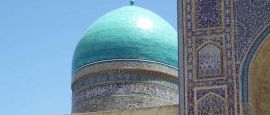Uzbekistan History, Language and Culture
History of Uzbekistan
Uzbekistan sits at the heart of Central Asia and has been shaped for millennia by migration, trade and empire. From at least the first millennium BCE, the region was home to advanced civilisations linked by the Silk Road, with cities such as Samarkand, Bukhara and Khiva emerging as major centres of commerce, scholarship and Islamic learning. These cities thrived on the exchange of goods, ideas and cultures between China, Persia, India and the Mediterranean world.
The region experienced a succession of conquests, most notably by Alexander the Great in the 4th century BCE and later by Arab armies, which brought Islam and transformed cultural life. In the 14th century, Timur (Tamerlane) established Samarkand as the capital of a vast empire, ushering in a golden age of architecture, science and the arts. Many of the grand madrasas, mosques and mausoleums that define Uzbekistan's historic cities today date from this period.
By the 19th century, much of present-day Uzbekistan had fallen under Russian imperial control, later becoming part of the Soviet Union. Soviet rule reshaped society, economy and borders, leaving a lasting legacy in language, infrastructure and urban planning. Uzbekistan gained independence in 1991, following the collapse of the USSR, and has since worked to balance modern development with the preservation of its rich cultural and historical heritage.
Did you know?
• Samarkand is one of the oldest continuously inhabited cities in the world, with a history stretching back more than 2,700 years.
• Ulugh Beg, a 15th-century ruler of Samarkand, was also a renowned astronomer who built one of the most advanced observatories of the medieval world and produced star charts accurate for centuries.
• Khiva's old town, Itchan Kala, was the first site in Central Asia to be designated a UNESCO World Heritage Site.
Language in Uzbekistan
Uzbek is the official language of Uzbekistan and is spoken nationwide. It belongs to the Turkic language family and is written in the Latin alphabet, although Cyrillic is still commonly seen, particularly among older generations and in informal contexts. Russian remains widely used as a second language, especially in cities, business settings, and government offices, and many signs, menus, and transport information are bilingual.
English is increasingly taught and spoken among younger people and those working in tourism, particularly in Tashkent, Samarkand, Bukhara, and Khiva, but overall proficiency remains limited. Outside major tourist centres, visitors should not expect widespread English use, and learning a few basic Uzbek or Russian phrases can be very helpful. Translation apps and offline dictionaries are useful tools, especially when travelling independently or in rural areas.




 You know where
You know where